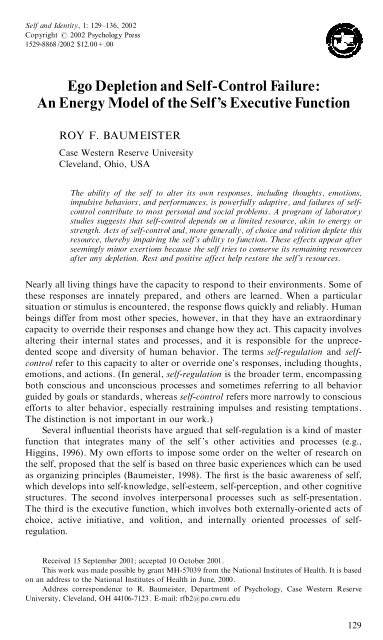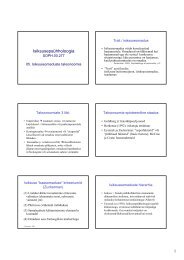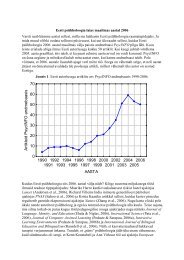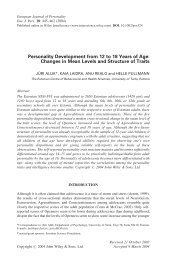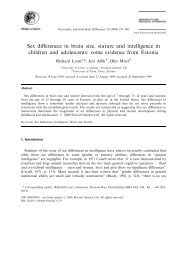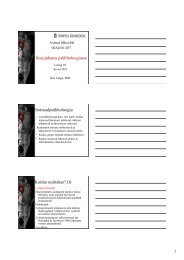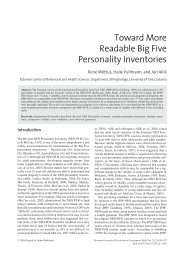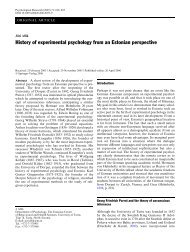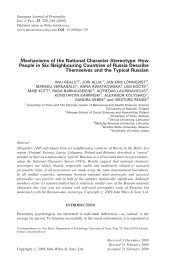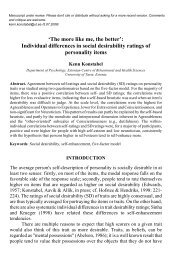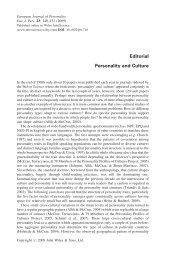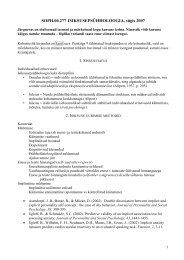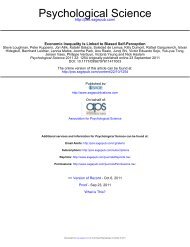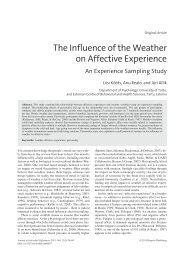Ego Depletion and Self-Control Failure: An Energy Model of the ...
Ego Depletion and Self-Control Failure: An Energy Model of the ...
Ego Depletion and Self-Control Failure: An Energy Model of the ...
Create successful ePaper yourself
Turn your PDF publications into a flip-book with our unique Google optimized e-Paper software.
<strong>Self</strong> <strong>and</strong> Identity, 1: 129±136, 2002Copyright # 2002 Psychology Press1529-8868 /2002 $12.00 + .00<strong>Ego</strong> <strong>Depletion</strong> <strong>and</strong> <strong>Self</strong>-<strong>Control</strong> <strong>Failure</strong>:<strong>An</strong> <strong>Energy</strong> <strong>Model</strong> <strong>of</strong> <strong>the</strong> <strong>Self</strong>’s Executive FunctionROY F. BAUMEISTERCase Western Reserve UniversityClevel<strong>and</strong>, Ohio, USAThe ability <strong>of</strong> <strong>the</strong> self to alter its own responses, including thoughts, emotions,impulsive behaviors, <strong>and</strong> performances, is powerfully adaptive, <strong>and</strong> failures <strong>of</strong> selfcontrolcontribute to most personal <strong>and</strong> social problems. A program <strong>of</strong> laboratorystudies suggests that self-control depends on a limited resource, akin to energy orstrength. Acts <strong>of</strong> self-control <strong>and</strong>, more generally, <strong>of</strong> choice <strong>and</strong> volition deplete thisresource, <strong>the</strong>reby impairing <strong>the</strong> self’s ability to function. These effects appear afterseemingly minor exertions because <strong>the</strong> self tries to conserve its remaining resourcesafter any depletion. Rest <strong>and</strong> positive affect help restore <strong>the</strong> self’s resources.Nearly all living things have <strong>the</strong> capacity to respond to <strong>the</strong>ir environments. Some <strong>of</strong><strong>the</strong>se responses are innately prepared, <strong>and</strong> o<strong>the</strong>rs are learned. When a particularsituation or stimulus is encountered, <strong>the</strong> response ¯ows quickly <strong>and</strong> reliably. Humanbeings differ from most o<strong>the</strong>r species, however, in that <strong>the</strong>y have an extraordinarycapacity to override <strong>the</strong>ir responses <strong>and</strong> change how <strong>the</strong>y act. This capacity involvesaltering <strong>the</strong>ir internal states <strong>and</strong> processes, <strong>and</strong> it is responsible for <strong>the</strong> unprecedentedscope <strong>and</strong> diversity <strong>of</strong> human behavior. The terms self-regulation <strong>and</strong> selfcontrolrefer to this capacity to alter or override one’s responses, including thoughts,emotions, <strong>and</strong> actions. (In general, self-regulation is <strong>the</strong> broader term, encompassingboth conscious <strong>and</strong> unconscious processes <strong>and</strong> sometimes referring to all behaviorguided by goals or st<strong>and</strong>ards, whereas self-control refers more narrowly to consciousefforts to alter behavior, especially restraining impulses <strong>and</strong> resisting temptations.The distinction is not important in our work.)Several in¯uential <strong>the</strong>orists have argued that self-regulation is a kind <strong>of</strong> masterfunction that integrates many <strong>of</strong> <strong>the</strong> self ’s o<strong>the</strong>r activities <strong>and</strong> processes (e.g.,Higgins, 1996). My own efforts to impose some order on <strong>the</strong> welter <strong>of</strong> research on<strong>the</strong> self, proposed that <strong>the</strong> self is based on three basic experiences which can be usedas organizing principles (Baumeister, 1998). The ®rst is <strong>the</strong> basic awareness <strong>of</strong> self,which develops into self-knowledge, self-esteem, self-perception, <strong>and</strong> o<strong>the</strong>r cognitivestructures. The second involves interpersonal processes such as self-presentation.The third is <strong>the</strong> executive function, which involves both externally-oriente d acts <strong>of</strong>choice, active initiative, <strong>and</strong> volition, <strong>and</strong> internally oriented processes <strong>of</strong> selfregulation.Received 15 September 2001; accepted 10 October 2001.This work was made possible by grant MH-57039 from <strong>the</strong> National Institutes <strong>of</strong> Health. It is basedon an address to <strong>the</strong> National Institutes <strong>of</strong> Health in June, 2000.Address correspondence to R. Baumeister, Department <strong>of</strong> Psychology, Case Western ReserveUniversity, Clevel<strong>and</strong>, OH 44106-7123 . E-mail: rfb2@po.cwru.edu129
130 R. F. BaumeisterThe purpose <strong>of</strong> this article is to provide a brief overview <strong>of</strong> <strong>the</strong> research programthat my colleagues <strong>and</strong> I have conducted in <strong>the</strong> effort to gain a greater underst<strong>and</strong>ing<strong>of</strong> how <strong>the</strong> self controls <strong>and</strong> regulates itself. The central idea is that self-controloperates on <strong>the</strong> basis <strong>of</strong> a limited resource, akin to energy or strength, that canbecome depleted through use. The depleted self is <strong>the</strong>n less able to carry out fur<strong>the</strong>racts <strong>of</strong> self-control. The resource is used not only in self-control but also in o<strong>the</strong>r acts<strong>of</strong> volition, <strong>and</strong> indeed it may be <strong>the</strong> basis for <strong>the</strong> self’s entire executive function.Importance <strong>of</strong> <strong>Self</strong>-<strong>Control</strong>The bene®ts <strong>of</strong> self-control can scarcely be overstated. Most major personal <strong>and</strong>social problems that face <strong>the</strong> United States involve some degree <strong>of</strong> failure at selfregulation(see Baumeister, Hea<strong>the</strong>rton, & Tice, 1994, for review). These includeaddiction, alcohol abuse, drug abuse, eating disorders <strong>and</strong> binges, unwanted pregnancy,AIDS <strong>and</strong> o<strong>the</strong>r sexually transmitted diseases, debt <strong>and</strong> bankruptcy, lack <strong>of</strong>savings, violent <strong>and</strong> criminal behavior, underachievement in school <strong>and</strong> work,procrastination, lack <strong>of</strong> exercise, <strong>and</strong> cigarette smoking, all <strong>of</strong> which could bereduced or eliminated if people controlled <strong>the</strong>ir behavior better.Evidence for <strong>the</strong> bene®ts <strong>of</strong> self-control emerged from research with a new traitscale developed by Tangney <strong>and</strong> Baumeister (2000) to measure individual differencesin self-control. People who scored high in self-control reported better outcomes in abroad range <strong>of</strong> spheres. They had higher grade-point averages in college. Theyreported fewer eating disorders <strong>and</strong> alcohol abuse problems. They had less psychopathology<strong>and</strong> fewer mental health problems across <strong>the</strong> board. (There was nosign <strong>of</strong> curvilinearity, contrary to <strong>the</strong> hypo<strong>the</strong>sis that excessive self-control is linkedto obsessive-compulsive symptoms or o<strong>the</strong>r problems.) They had better <strong>and</strong> morestable interpersonal relationships. They had fewer emotional problems <strong>and</strong> managed<strong>the</strong>ir anger better.O<strong>the</strong>r work has extended <strong>the</strong>se ®ndings. Tice <strong>and</strong> Baumeister (1997) found thatprocrastinators (who regulate <strong>the</strong>ir time-limited performances ineffectively) sufferedgreater stress <strong>and</strong> health problems than o<strong>the</strong>r students <strong>and</strong> also ended up withpoorer grades. Engels, Finkenauer, den Exter Blokl<strong>and</strong>, <strong>and</strong> Baumeister (2000)found that adolescents with high self-control were less likely to engage in delinquentmisbehavior such as ®ghting, v<strong>and</strong>alism, <strong>and</strong> petty <strong>the</strong>ft, <strong>and</strong> <strong>the</strong>y also had betterrelationships with <strong>the</strong>ir parents.In sum, our work converges with o<strong>the</strong>r ®ndings to indicate that self-control isextremely bene®cial. In fact, one person’s good self-control seems to bene®t not onlythat person but o<strong>the</strong>r people around that person <strong>and</strong> even society at large. <strong>Self</strong>controlmay be contrasted with self-esteem, which at present is widely cultivated <strong>and</strong>is <strong>of</strong>ten regarded as a cause <strong>of</strong> positive outcomes but which in empirical fact hasshown surprisingly little in <strong>the</strong> way <strong>of</strong> direct bene®ts or desirable consequences. If itwere up to me to set national policy in psychological matters, I would recommendreplacing <strong>the</strong> cultivation <strong>of</strong> self-esteem with <strong>the</strong> cultivation <strong>of</strong> self-control.Strength <strong>Model</strong>My work has focused on how <strong>the</strong> self overrides its responses <strong>and</strong> changes its innerstates. This can be regarded as <strong>the</strong> ``operate’’ phase <strong>of</strong> <strong>the</strong> feedback-loop modelarticulated by Carver <strong>and</strong> Scheier (1981, 1998). The feedback loop is a supervisoryprocess that tests <strong>the</strong> current state against st<strong>and</strong>ards such as goals <strong>and</strong> expectations.
132 R. F. Baumeister(Muraven, Baumeister, & Tice, 1999). Over <strong>the</strong> course <strong>of</strong> two weeks, participantsperformed various exercises in self-regulation, such as improving <strong>the</strong>ir posture,keeping track <strong>of</strong> what <strong>the</strong>y ate, or regulating <strong>the</strong>ir emotions. These participants <strong>the</strong>nshowed signi®cantly improved self-control (on laboratory measures) relative to acontrol group <strong>of</strong> participants who had not performed such exercises. To clarify, <strong>the</strong>reare in principle two ways in which strength could be improved, <strong>and</strong> we found onlyone <strong>of</strong> <strong>the</strong>m. Exercise may give a muscle greater initial power or it can give it morestamina (so that it can continue to perform at top capacity for a longer time). Wefound <strong>the</strong> latter, not <strong>the</strong> former. The exercises in self-control appear to haveimproved people’s ability to resist <strong>the</strong> debilitating pattern <strong>of</strong> resource depletion.Alternative explanations could be suggested for some <strong>of</strong> <strong>the</strong>se ®ndings, <strong>and</strong> wehave conducted additional studies to rule <strong>the</strong>m out. These include (a) <strong>the</strong> view thatearly quitting depends on recognizing <strong>the</strong> tasks as impossible, (b) <strong>the</strong> view thatparticipants feel <strong>the</strong>y have done enough to satisfy <strong>the</strong> experiment already before <strong>the</strong>measure, (c) <strong>the</strong> possibility that <strong>the</strong> self-control task was more unpleasant than <strong>the</strong>control conditions, <strong>and</strong> (d) <strong>the</strong> notion that <strong>the</strong> ®rst exertion <strong>of</strong> self-control createsnegative affect which impairs <strong>the</strong> willingness to control <strong>the</strong> self on <strong>the</strong> second task.Readers interested in those debates may wish to consult <strong>the</strong> empirical publications(Baumeister et al., 1998; Muraven et al., 1998). Those articles also consideredalternative models <strong>of</strong> self-control, including ones that depicted it as based on cognitiveschemas <strong>and</strong> knowledge structures or as a skill.Taken toge<strong>the</strong>r, <strong>the</strong>se results suggest that a broad assortment <strong>of</strong> self-regulatoryefforts draw upon a common resource <strong>and</strong> deplete it. The capacity for self-controldepends on a single stock <strong>of</strong> a resource that operates like an energy or strength. Ourprocedures involved most <strong>of</strong> <strong>the</strong> major kinds <strong>of</strong> self-regulationÐspeci®cally, we hadpeople regulate <strong>the</strong>ir thoughts, <strong>the</strong>ir emotions, <strong>the</strong>ir impulses, <strong>and</strong> <strong>the</strong>ir task performance.In most studies, <strong>the</strong> manipulation involved one domain <strong>and</strong> <strong>the</strong> dependentmeasure a different domain. A common resource is thus used for <strong>the</strong>se seeminglydiverse acts <strong>of</strong> self-regulation. Moreover, <strong>the</strong> resource seems fairly limited becauseeven brief <strong>and</strong> seemingly minor exertions in our laboratory tasks were suf®cient todeplete it.Choosing <strong>and</strong> DecidingHaving concluded that self-control depends on a single, common resource, wereturned to consider <strong>the</strong> self’s executive function more generally. Modern self <strong>the</strong>oryhas made relatively less progress in underst<strong>and</strong>ing <strong>the</strong> executive, agentic functions<strong>of</strong> <strong>the</strong> self than in underst<strong>and</strong>ing o<strong>the</strong>r aspects <strong>of</strong> <strong>the</strong> self (see Baumeister, 1998).A possible reason for this relatively slow progress would be that an energy modelwas needed to underst<strong>and</strong> how <strong>the</strong> self chooses, decides, initiates action, <strong>and</strong> <strong>the</strong>like. <strong>Energy</strong> models are far out <strong>of</strong> fashion in modern psychological <strong>the</strong>ory, <strong>and</strong> so itseemed plausible that <strong>the</strong>re might be a link between <strong>the</strong> failure to use energy models<strong>and</strong> <strong>the</strong> failure to underst<strong>and</strong> <strong>the</strong> self as agent.In short, might <strong>the</strong> same energy resource used in self-regulation also be neededfor o<strong>the</strong>r operations <strong>of</strong> <strong>the</strong> executive function? We conducted several additionalstudies to see whe<strong>the</strong>r depletion <strong>of</strong> regulatory resources would affect <strong>the</strong> self’sdecision-making <strong>and</strong> vice versa.The ®rst <strong>of</strong> <strong>the</strong>se studies borrowed <strong>the</strong> choice procedures from cognitive dissonanceresearch. Linder, Cooper, <strong>and</strong> Jones (1967) found that dissonance onlyoccurred when people went through an inner process <strong>of</strong> deciding <strong>and</strong> agreeing to
<strong>Ego</strong> <strong>Depletion</strong> <strong>and</strong> <strong>Self</strong>-<strong>Control</strong> <strong>Failure</strong> 133perform <strong>the</strong> counterattitudinal task. Baumeister et al. (1998) adapted <strong>the</strong> manipulation<strong>of</strong> high or low perceived choice to make a counterattitudinal speech. Instead<strong>of</strong> measuring subsequent attitudes as dissonance researchers have done, however, wemeasured persistence on unsolvable geometric puzzles, just as in <strong>the</strong> radish <strong>and</strong>cookie experiment described earlier. As predicted, <strong>the</strong> people who had consentedunder high choice to make <strong>the</strong> counterattitudinal speech gave up faster on <strong>the</strong>unsolvable puzzles, as compared to people who were simply told to make <strong>the</strong> samespeech without having been given any choice in <strong>the</strong> matter. Thus, making aresponsible choice apparently depleted <strong>the</strong> same resource that was used for selfregulation,producing <strong>the</strong> same essential effect as we had found by making peopleresist eating <strong>the</strong> tempting cookies <strong>and</strong> chocolates.Subsequent work has yielded similar conclusions. Twenge, Tice, Schmeichel, <strong>and</strong>Baumeister (2000) required people to make a long series <strong>of</strong> choices about commercialproducts, <strong>and</strong> this series <strong>of</strong> choices depleted <strong>the</strong>m, as indicated by <strong>the</strong>ir relativelypoor ability to make <strong>the</strong>mselves consume a bitter beverage. <strong>Control</strong> conditionparticipants furnished ratings <strong>of</strong> <strong>the</strong>ir prior usage <strong>of</strong> <strong>the</strong> same products, but this didnot seem to deplete <strong>the</strong>ir ability to make <strong>the</strong>mselves drink <strong>the</strong> aversive liquid.Decisions thus affect self-controlÐwould self-control also affect decisions? Inyet ano<strong>the</strong>r study, we had people ®rst regulate <strong>the</strong>ir behavior by having to form <strong>and</strong><strong>the</strong>n break a habit (<strong>of</strong> crossing out all instances <strong>of</strong> <strong>the</strong> letter ``e’’ in a page <strong>of</strong> text).This procedure made people more likely to take <strong>the</strong> passive option in a decision task.In o<strong>the</strong>r words, people were more likely to take <strong>the</strong> line <strong>of</strong> least resistance, even if itwas not to <strong>the</strong>ir advantage. Although fur<strong>the</strong>r replication <strong>of</strong> this pattern seemsdesirable, <strong>the</strong> evidence does suggest that <strong>the</strong> initial act <strong>of</strong> self-regulation depleted aresource that would be useful for active volition <strong>and</strong> rendered people more passive.Thus, again, <strong>the</strong> same resource is used in self-regulation as in making choices.The energy resource indicated by our results is thus not restricted to self-control butappears to be central to <strong>the</strong> self’s executive function generally, including acts <strong>of</strong> choice,volition, active instead <strong>of</strong> passive responding, <strong>and</strong> taking responsibility. We <strong>the</strong>reforefavored <strong>the</strong> term ego depletion to describe <strong>the</strong> condition that arises when <strong>the</strong> self’sresources have been expended <strong>and</strong> <strong>the</strong> self is temporarily operating at less than full power.Conservation or Exhaustion?The self’s capacity for regulating itself appears to be limited. For example, Baumeisteret al. (1998) found that a mere ®ve minutes <strong>of</strong> resisting <strong>the</strong> temptation to eat cookies <strong>and</strong>making oneself eat radishes instead reduced subsequent persistence on dif®cult puzzlesfrom 21 minutes to 8 minutesÐa difference <strong>of</strong> approximately two st<strong>and</strong>ard deviations.But how limited is it? There are two ways to interpret <strong>the</strong>se ®ndings <strong>of</strong> egodepletion. One is that <strong>the</strong> self’s capacity for regulating itself is indeed radicallyreduced even by <strong>the</strong>se seemingly minor laboratory manipulations. According to thisview, <strong>the</strong> self’s stock <strong>of</strong> energy is extremely small.On <strong>the</strong> o<strong>the</strong>r h<strong>and</strong>, one could read <strong>the</strong>se ®ndings as indicating conservationra<strong>the</strong>r than exhaustion. According to this view, <strong>the</strong> initial exercise does deplete <strong>the</strong>self’s resources, not to a catastrophic degree, but enough to motivate <strong>the</strong> person toconserve what is left. This view would be most consistent with <strong>the</strong> analogy to amuscle. Athletes do not exert <strong>the</strong>mselves at maximum output right up to <strong>the</strong> point <strong>of</strong>exhaustion. Ra<strong>the</strong>r, once <strong>the</strong>ir muscles begin to have fatigue, <strong>the</strong>y conserve <strong>the</strong>irenergy. In <strong>the</strong> same way, <strong>the</strong> self might be conserving its reduced resources in case anurgent decision had to be made or a powerful impulse needed to be sti¯ed.
134 R. F. BaumeisterEvidence <strong>of</strong> conservation was provided by Muraven (1998) who showed that <strong>the</strong>effects <strong>of</strong> ego depletion could be resisted if <strong>the</strong> stakes were high enough. Whenrelatively substantial amounts <strong>of</strong> money were contingent on performance on <strong>the</strong>second self-control task, people were able to perform well despite having engaged ina previous self-control task. If <strong>the</strong> self’s resources were truly exhausted, <strong>the</strong> incentiveswould make little or no difference, because <strong>the</strong> self would be utterly incapable<strong>of</strong> fur<strong>the</strong>r regulation. Instead, <strong>the</strong> results suggested that <strong>the</strong> depleted self simplydisdains to exert itself for relatively unimportant tasks <strong>and</strong> instead conserves itsenergy for important tasks.Muraven’s (1998) second study provided a different kind <strong>of</strong> evidence for conservation.The main part <strong>of</strong> <strong>the</strong> design was <strong>the</strong> same as in o<strong>the</strong>r studies, namelyhaving people perform two consecutive (but seemingly unrelated) acts <strong>of</strong> selfcontrol.The crucial change was that prior to <strong>the</strong> second task, some people were toldthat <strong>the</strong>re would be a third task that would also require self-control. These peoplegave up signi®cantly faster than o<strong>the</strong>r participants on <strong>the</strong> second taskÐpresumablybecause <strong>the</strong>y were saving <strong>the</strong>ir resources for <strong>the</strong> third task.Taken toge<strong>the</strong>r, <strong>the</strong>se results suggest that <strong>the</strong> self’s capacity for self-regulation isindeed limited, but not as limited as one might think at ®rst blush. Acts <strong>of</strong> selfregulation<strong>and</strong> volition deplete <strong>the</strong> resource, but <strong>the</strong>y do not exhaust it utterly.Ra<strong>the</strong>r, <strong>the</strong> depletion is suf®cient to set <strong>of</strong>f a conservation process. New challengesare apparently evaluated for <strong>the</strong>ir importance. If <strong>the</strong>y are not highly important, <strong>the</strong>self holds back from exerting itself, but when something important does arise, <strong>the</strong>self is willing to expend more <strong>of</strong> its remaining resources.ReplenishmentSomehow, <strong>the</strong> resources expended by acts <strong>of</strong> self-control <strong>and</strong> volition are graduallyreplenished. (If <strong>the</strong>y were not, <strong>the</strong>n each act <strong>of</strong> depletion would be permanent, <strong>and</strong><strong>the</strong> self would soon cease to function altoge<strong>the</strong>r!) Sleep <strong>and</strong> rest provide one wayto replenish <strong>the</strong> self. Assorted evidence about patterns <strong>of</strong> self-control failurereviewed by Baumeister et al. (1994) indicated that well-rested people have betterself-control. Few self-control failures occur ®rst thing in <strong>the</strong> morning, when peoplehave had a good night’s sleep. On <strong>the</strong> contrary, self-control seems to grow graduallyweaker as <strong>the</strong> day wears on. Diets are broken in <strong>the</strong> evening, impulsivecrimes <strong>and</strong> violent acts occur most <strong>of</strong>ten after midnight, addictive relapses occurlater in <strong>the</strong> day, <strong>and</strong> so forth. Gambling casinos, which depend for <strong>the</strong>ir pro®ts onimpulsive behavior, are <strong>of</strong>ten deliberately designed with no clocks <strong>and</strong> no externalwindows so that people will not realize how late it has gotten, <strong>and</strong> <strong>the</strong> bright lights<strong>and</strong> loud noises may help keep <strong>the</strong>m awake past <strong>the</strong>ir normal hoursÐ<strong>the</strong>rebyreducing <strong>the</strong> likelihood that any given customer will make <strong>the</strong> sensible, self-disciplineddecision to cut his or her losses <strong>and</strong> go to bed before losing any moremoney.Positive emotions also seem to have some value for replenishing <strong>the</strong> self’s stock<strong>of</strong> energy <strong>and</strong> its capacity for self-regulation. Tice, Dale, <strong>and</strong> Baumeister (2000)conducted several studies to assess <strong>the</strong> effects <strong>of</strong> positive affect on <strong>the</strong> depleted self.These followed <strong>the</strong> usual procedure <strong>of</strong> having participants engage in two consecutive,seemingly unrelated acts <strong>of</strong> self-control. In between <strong>the</strong> two, however, someparticipants received an induction <strong>of</strong> positive or negative mood. The people whowere put into a positive mood showed less evidence <strong>of</strong> ego depletion, suggesting that<strong>the</strong> good emotional state helped counteract <strong>the</strong> depleting effect <strong>of</strong> <strong>the</strong> ®rst task.
<strong>Ego</strong> <strong>Depletion</strong> <strong>and</strong> <strong>Self</strong>-<strong>Control</strong> <strong>Failure</strong> 135Implications, Speculations, <strong>and</strong> Directions for Fur<strong>the</strong>r ResearchFor both pragmatic <strong>and</strong> ethical reasons, <strong>the</strong> patterns <strong>of</strong> ego depletion studied in mylaboratory have tended to be ra<strong>the</strong>r minor. It seems likely that some severe mentalhealth problems re¯ect more formidable degrees <strong>of</strong> depletion. Burnout may arisewhen mental health pr<strong>of</strong>essionals have exhausted <strong>the</strong>ir resources in futile efforts tohelp people. Trauma victims may become passive <strong>and</strong> unable to function because <strong>the</strong>need to cope with <strong>the</strong> aftermath <strong>of</strong> trauma (including affect regulation) exhausts<strong>the</strong>ir resources. Learned helplessness may be less a matter <strong>of</strong> inferring noncontingencythan a matter <strong>of</strong> having expended <strong>the</strong> self’s resources in <strong>the</strong> futileattempt to exert control over an uncontrollable situation. Fur<strong>the</strong>r work may pr<strong>of</strong>itablyexamine <strong>the</strong> role <strong>of</strong> ego depletion in <strong>the</strong>se severe disturbances.<strong>An</strong>o<strong>the</strong>r promising line <strong>of</strong> inquiry will be to illuminate <strong>the</strong> physiological processesassociated with depletion <strong>and</strong> replenishment. If some form <strong>of</strong> energy isdepleted by acts <strong>of</strong> self-regulation <strong>and</strong> volition, it should eventually become possibleto isolate <strong>the</strong> physiological mechanisms. Undoubtedly brain processes are involvedin self-regulation, <strong>and</strong> <strong>the</strong>se should change discernibly over <strong>the</strong> course <strong>of</strong> egodepletion.Fur<strong>the</strong>r work is also needed on how to increase <strong>the</strong> self’s resources <strong>and</strong>streng<strong>the</strong>n its capacity for self-regulation. In <strong>the</strong> long run, clinical <strong>the</strong>rapists may beable to help mentally ill people by designing exercises that will build <strong>the</strong>ir capacityfor controlling <strong>the</strong>ir thoughts, emotions, <strong>and</strong> impulses.ReferencesBaumeister, R. F. (1998). The self. In D. T. Gilbert, S. T. Fiske, & G. Lindzey (Eds.),H<strong>and</strong>book <strong>of</strong> social psychology (4th ed., pp. 680±740). New York: McGraw-Hill.Baumeister, R. F., Bratslavsky, E., Muraven, M., & Tice, D. M. (1998). <strong>Ego</strong> depletion: Is <strong>the</strong>active self a limited resource? Journal <strong>of</strong> Personality <strong>and</strong> Social Psychology, 74, 1252±1265.Baumeister, R. F., & Hea<strong>the</strong>rton, T. F. (1996). <strong>Self</strong>-regulation failure: <strong>An</strong> overview. PsychologicalInquiry, 7, 1±15.Baumeister, R. F., Hea<strong>the</strong>rton, T. F., & Tice, D. M. (1994). Losing control: How <strong>and</strong> whypeople fail at self-regulation. San Diego, CA: Academic Press.Carver, C. S., & Scheier, M. F. (1981). Attention <strong>and</strong> self-regulation: A control <strong>the</strong>ory approachto human behavior. New York: Springer-Verlag.Carver, C. S., & Scheier, M. F. (1998). On <strong>the</strong> self-regulation <strong>of</strong> behavior. New York:Cambridge, University Press.Engels, R., Finkenauer, C., den Exter Blokl<strong>and</strong>, E. A. W., & Baumeister, R. F. (2000).Parental in¯uences on self-control <strong>and</strong> juvenile delinquency. Manuscript in preparation,Utrecht University, Ne<strong>the</strong>rl<strong>and</strong>s.Higgins, E. T. (1996). The ``self digest’’: <strong>Self</strong>-knowledge serving self-regulatory functions.Journal <strong>of</strong> Personality <strong>and</strong> Social Psychology, 71, 1062±1083.Linder, D. E., Cooper, J., & Jones, E. E. (1967). Decision freedom as a determinant <strong>of</strong> <strong>the</strong> role<strong>of</strong> incentive magnitude in attitude change. Journal <strong>of</strong> Personality <strong>and</strong> Social Psychology,6, 245±254.Mischel, W. (1996). From good intentions to willpower. In P. Gollwitzer & J. Bargh (Eds.),The psychology <strong>of</strong> action (pp. 197±218). New York: Guilford.Muraven, M. (1998). Mechanisms <strong>of</strong> self-control failure: Motivation <strong>and</strong> limited resources.Unpublished doctoral dissertation, Case Western Reserve University, Clevel<strong>and</strong>, OH.Muraven, M. R., & Baumeister, R. F. (2000). <strong>Self</strong>-regulation <strong>and</strong> depletion <strong>of</strong> limitedresources: Does self-control resemble a muscle? Psychological Bulletin, 126, 247±259.
136 R. F. BaumeisterMuraven, M., Baumeister, R. F., & Tice, D. M. (1999). Longitudinal improvement <strong>of</strong> selfregulationthrough practice: Building self-control through repeated exercise. Journal <strong>of</strong>Social Psychology, 139, 446±457.Muraven, M., Tice, D. M., & Baumeister, R. F. (1998). <strong>Self</strong>-control as limited resource:Regulatory depletion patterns. Journal <strong>of</strong> Personality <strong>and</strong> Social Psychology, 74, 774±789.Tangney, J. P., & Baumeister, R. F. (2000). High self-control predicts good adjustment, lesspathology, better grades, <strong>and</strong> interpersonal success. Manuscript submitted for publication.Tice, D. M., & Baumeister, R. F. (1997). Longitudinal study <strong>of</strong> procrastination, performance,stress, <strong>and</strong> health: The costs <strong>and</strong> bene®ts <strong>of</strong> dawdling. Psychological Science, 8, 454±458.Tice, D. M., Dale, K. P., & Baumeister, R. F. (2000). Replenishing <strong>the</strong> self: Positive emotions<strong>of</strong>fset <strong>the</strong> effects <strong>of</strong> ego depletion. Manuscript in preparation, Case Western ReserveUniversity.Twenge, J. M., Tice, D. M., Schmeichel, B., & Baumeister, R. F. (2000). Decision fatigue:Making multiple personal decisions depletes <strong>the</strong> self’s resources. Manuscript submittedfor publication.Wegner, D. M., Schneider, D. J., Carter, S. R., & White, T. L. (1987). Paradoxical effects <strong>of</strong>thought suppression. Journal <strong>of</strong> Personality <strong>and</strong> Social Psychology, 53, 5±13.


